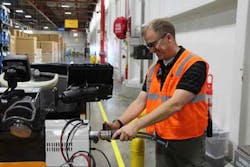Plug Power supplying Fuel Cells, Infrastructure to Food Transporter, also planning H2 Production Plant
Hydrogen fuel cell manufacturer Plug Power continues to expand its H2 supply network in a new agreement with food logistics company FreezPak Logistics.
Under the agreement, Plug Power will provide fuel cells and hydrogen storage and fueling infrastructure at nine additional sites and nearly 400 lift trucks for the third-party food trucking and delivery firm. Altogether, Plug will support close to a dozen sites, including three already in operation.
FreezPak and Plug have been partners for close to eight years. Plug also has more recent supply and infrastructure deals with Amazon, Walmart and Home Depot.
“FreezPak Logistics has been a longstanding believer in Plug’s innovative technology and hydrogen fuel cells,” Andy Marsh, Plug CEO, said. “We are thrilled to expand our partnership, which further improves the American supply chain and decreases carbon emissions.”
The food logistics firm estimated that productivity has risen 100 percent because the fuel cells operate at full power throughout a shift and do need recharging as often as batteries, according to the companies. The use of H2 has contributed to greenhouse gas reduction and a 31.5 percent drop in electricity bills, the company says.
“FreezPak continually strives for ways to be more efficient, sustainable and increase productivity,” Dave Saoud, FreezPak Logistics Co-Founder/CEO, said. “Given our long-term relationship with Plug, it makes sense to work together toward a common vision — progression and reducing carbon emissions.”
Read our full coverage of the role of Hydrogen Fuel Cells
Also on Wednesday, Plug Power and electrolytic H2 producer Olin Corp. announced the launch of a joint venture to begin with the construction of a 15-ton-per-day hydrogen plant in St. Gabriel, Louisiana.
The joint venture, named Hidrogenii, will support reliability of supply and speed to market for green hydrogen throughout North America, setting the foundation for broader collaboration between the two companies.
The partnership brings together Plug and Olin, North America’s largest producer of electrolytic hydrogen. Plug will be the exclusive marketer of the joint venture’s hydrogen and provide logistical support for delivery, while Olin will provide reliable hydrogen supply and operational expertise, according to the release.
“Plug is working rapidly to meet the increasing demand of green hydrogen in North America and in the rest of the world,” Andy Marsh, CEO of Plug, said. “By partnering with like-minded companies, such as Olin, we’ll make the transition to hydrogen easy and affordable.”
Fuel cells can take an energy resource, such as hydrogen or natural gas, and convert it to electricity via an electrochemical reaction.
Hydrogen does not contain a carbon atom and so does not release CO2 into the atmosphere when combusted. To be considered truly “green,” the hydrogen must be generated using electrolyzers powered by low or carbon-free power such as hydro, solar, wind or nuclear.
About the Author
EnergyTech Staff
Rod Walton is head of content for EnergyTech.com. He has spent 17 years covering the energy industry as a newspaper and trade journalist.
Walton formerly was energy writer and business editor at the Tulsa World. Later, he spent six years covering the electricity power sector for Pennwell and Clarion Events. He joined Endeavor and EnergyTech in November 2021.
He can be reached at [email protected].
EnergyTech is focused on the mission critical and large-scale energy users and their sustainability and resiliency goals. These include the commercial and industrial sectors, as well as the military, universities, data centers and microgrids.
Many large-scale energy users such as Fortune 500 companies, and mission-critical users such as military bases, universities, healthcare facilities, public safety and data centers, shifting their energy priorities to reach net-zero carbon goals within the coming decades. These include plans for renewable energy power purchase agreements, but also on-site resiliency projects such as microgrids, combined heat and power, rooftop solar, energy storage, digitalization and building efficiency upgrades.
